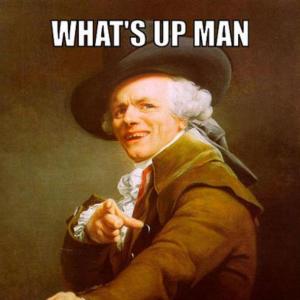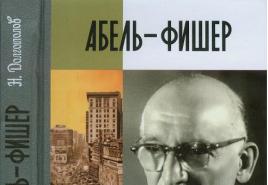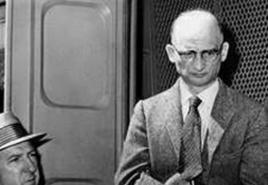Whatsapp how the word is translated into Russian. How WhatsApp translates into Russian Why what is up translates how are you
English-Russian translation WHAT "S UP
"what do you hear?", "how are you?", "how are you?": - What "s up! - Mick says to John as soon as he hears his voice in the receiver.
English-Russian slang dictionary. English-Russian slang dictionary. 2012
→ English-Russian dictionaries → English-Russian slang dictionary
There are also meanings of the word and translation of WHAT "S UP from English into Russian in English-Russian dictionaries and from Russian into English in Russian-English dictionaries.
More meanings of this word and English-Russian, Russian-English translations for the word "WHAT" S UP "in dictionaries.
- WHAT "S UP? - interj. What" s happening ?, what "s going on ?, how do you feel? (In Canada and the USA); what" s wrong with you? (In ...
- WHAT "S UP - what" s going on ?, what "s new ?, how are you?
Explanatory Dictionary of the English Language - Edited by bed - WHAT "S UP? - informal what is going on? What is the matter? → up
Concise Oxford English vocab - WHAT "S UP - \u003d what" s doing
Slang English vocab - WHAT "S UP - See PROBLEM 14
- WHAT "S UP - what is happening what is the latest news?" Bugs Bunny says to Elmer Fudd, "" A bee "n a bee! What" s ...
English Idioms vocab - WHAT "S UP? - What" s new? What "s happening?
English Idioms vocab - WHAT "S UP - what is happening? What is the latest news? Bugs Bunny says to Elmer Fudd," A bee "n a bee! What" s ...
English Idioms vocabulary - WHAT "S UP - slang What is happening or planned; what is wrong. Often used as a greeting." What "s up?" asked Bob as he ...
American Idioms English vocabulary - WHAT "S UP?
- WHAT "S UP
- WHAT 'S UP - what's up, what's up, what's up
English-Russian-dictionary - Bed release - WHAT "S UP
English-Russian-English dictionary of slang, jargon, Russian names - WHAT "S UP? - What" s up ?: 1. What's the matter ?; What happened?; 2. How are you ?; What do you hear?
English-Russian Dictionary of English Idioms - WHAT "S UP? - 1. What's the matter ?; What's going on ?; 2. How are you ?; Heard what?
English-Russian idiom dictionary - WHAT "S UP - How are you ?; What's new?
Computer English-Russian dictionary - WHAT "S UP -" heard what? "," How are you? "," How are you? ": - What" s up! - Mick says to John as soon as he hears his voice in the receiver ...
English Russian slang dictionary - WHAT "S UP? - what" s up ?: (jarg.) What happened ?, what's the matter?
New Comprehensive English-Russian Dictionary -
-
Longman DOCE5 Extras English vocabulary - WHAT - I. (|) (h) wä] t, (|) (h) wə] also (|) (h) wȯ]; usu] d. + V pronoun Etymology: Middle English, from Old English hwæt, neuter of hwā who; akin ...
- - I. (|) əp adverb Etymology: partly from Middle English up upward, from Old English ūp; partly from Middle English uppe on ...
Webster "s New International English Dictionary - WHAT - / hwut, hwot, wut, wot /; unstressed / hweuht, weuht /, pron. 1. (used interrogatively as a request for specific information): What ...
-
Random House Webster "s Unabridged English Dictionary - WHAT - I. ˈhwät, ˈhwət, ˈwät, ˈwət pronoun Etymology: Middle English, from Old English hwæt, neuter of hwā who - more at ...
- - I. ˈəp adverb Etymology: partly from Middle English up upward, from Old English ūp; partly from Middle English uppe on ...
Merriam-Webster "s Collegiate English vocabulary - WHAT - noun something; thing; stuff. 2.what (pron, adj, adv) as a relative pronoun. 3.what (interrogative adv) why? for what ...
Webster English vocab - - prep upon. 2.up adv aside, so as not to be in use; as, to lay up riches; put up ...
Webster English vocab - WHAT - pron (bef. 12c) 1 a (1) - used as an interrogative ...
Merriam-Webster English vocab - WHAT - / wɒt; NAmE wɑːt; wʌt / pronoun, determiner 1. used in questions to ask for particular information about sb / sth:…
- - / ʌp; NAmE / adverb, preposition, adjective, verb, noun ■ adverb HELP NOTE: For the…
Oxford Advanced Learner "s English Dictionary - WHAT - what S1 W1 / wɒt $ wɑːt, wʌt / BrE AmE pronoun, determiner, predeterminer [Language: Old English; Origin: ...
- - I. up 1 S1 W1 / ʌp / BrE AmE adverb, preposition, adjective 1. TO A HIGHER POSITION towards ...
Longman Dictionary of Contemporary English - WHAT - adj., Pron., & Adv. --interrog.adj. 1 asking for a choice from an indefinite number or for a statement of amount, ...
- - adv., Prep., Adj., N., & V. --adv. 1 at, in, or towards a higher place or position (jumped up in ...
Basic English Conversational Dictionary - WHAT - adj., Pron., & Adv. interrog.adj. 1 asking for a choice from an indefinite number or for a statement of amount, ...
- - adv., Prep., Adj., N., & V. adv. 1 at, in, or towards a higher place or position (jumped up in ...
Concise Oxford English Dictionary - WHAT - adj., Pron., & Adv. --interrog.adj. 1. asking for a choice from an indefinite number or for a statement of amount, ...
Oxford English vocab - - I. PREPOSITION, ADVERB, AND ADJECTIVE USES The preposition is pronounced / ʌp /. The adverb and adjective are pronounced / ʌp /. Frequency: The…
- WHAT - Usually pronounced / (h) wɒt / for meanings 2, 4 and 5. Frequency: The word is one of the 700 most common words ...
Collins COBUILD Advanced Learner "s English Dictionary - WHAT - Frequency: The word is one of the 700 most common words in English. 1. You use ~ in questions when ...
Collins COBUILD - Explanatory Dictionary of English for Language Learners - WHAT
Longman DOCE5 Extras English vocabulary - - Synonyms and related words: above, abovestairs, access, accession, accretion, accrual, accruement, accumulation, add to, addition, advance, against, aggrandize, aggrandizement, ...
Moby Thesaurus English vocabulary - - INDEX: 1. moving up to a higher place 2. looking, facing, or pointing upwards 3. to move upwards through the ...
Longman Activator English vocab - WHAT - pronoun 1 BAD: A woman can do everything what a man can do. GOOD: A woman can do ...
Longman Common Errors English vocabulary - WHAT
Large English-Russian Dictionary
Have you noticed that all conversations among English speakers begin with the phrases “How are you?”, “What’s up?”, “How’s it going?” etc. However, not everyone knows how to correctly answer these questions. In this article you will find enough information and learn how to easily, almost automatically, select the right words and expressions to answer the main greeting phrases-questions of the interlocutor.
Here you have a lot of options, it all depends on the current state of affairs, since this question is translated "How are you (you)?" or "How are you?" Therefore, answer exactly how you are doing. And in English it might look like this:
Fine... Fine.
The simplest and most direct answer. If you limit yourself to just this word, then the interlocutor may decide that you are not going to continue the conversation with him. Basically, you now understand how to respond to show that you are not in the mood to talk to a particular person.
Not bad. Not bad.
This answer already sounds more welcoming than "fine".
Fine, thanks. Excellent thank you.
This is a formal answer. Thus, you can respond to someone with whom you are not familiar. For example, a waiter in a restaurant.
Very well, thanks. Very good thanks.
A person who loves all sorts of grammatical norms and rules is likely to answer that way. From a technical point of view, the question "How ...?" (How ...?) You need to answer with an adverb. However, many English speakers simply don't give a damn. Those who are used to observing everything that is written in the textbooks insist on using grammatically correct constructions.
Pretty good. Pretty good.
If your grammar is somehow on the drum, you can say "Good" or "Pretty good". This is the more generally accepted and much more natural answer. That is exactly what most ordinary people say.
Great! How are you doing?
Wonderful! And how are you?This is such a pretty enthusiastic and joyful response. If you want to continue the conversation, it is best to always ask the other person counter questions.
I'm hanging in there.
So so (neither bad nor good).This is the answer if you have had a tough day.
I've been better. There have been better ones.
A: How are you? How are you?
B: I've been better . There have been better ones.
A: What’s wrong? What's wrong? (What happened?)
B: I just found out that I’m being laid off.
I just found out I was fired. How to answer a question How’s it going?
This question is similar to "How are you?" The meaning is the same - "How are things going?" All the answers discussed above are also suitable for "How's it going?"
And here is another answer to the question “How’s it going?”, Which is no longer suitable for “How are you?”.
It's going well. All right. (Dosl .: going well).
This is a friendly and correct answer that suits colleagues, clients, and acquaintances whom you have not seen for a while.
How to answer What's up?

This is probably one of the most difficult questions for those who study English, because many people are interested in how to answer it correctly.
It is similar to the question "What's happening in your life?" (What's going on in your life?) But no one forces you to answer honestly. If you don't want to have a long conversation, you can use one of the standard answers:
Nothing much . Nothing special.
This is the most common option. You can supplement it with some interesting details that occur (if any). For example, " Nothing much. Just getting ready for Tom's graduation"(Nothing special, just getting ready for Tom's graduation).
Not a lot.
This is another very common answer. The meaning is the same, but it is a little fresher than "Nothing much" because it is used a little less often.
Nothing. Nothing.
As short and specific as possible. You might sound rude or mean in this way.
Oh, just the usual. Everything is as usual.
Answer this if you do the same thing every day, and nothing, in principle, changes.
Just the same old same old.
Everything is the same, everything is the same.This expression means that you do the same thing every day, and you are a little tired of it.
Oh gosh, all kinds of stuff!
Yes, a lot of everything!You've been very busy and something interesting happened in your life recently.
How to answer a question What's happening?
This question means the same as What’s up?, So the answers to it can be used the same as those discussed above.
You now have many answers to basic welcome questions in English. You can use any of them as appropriate. Remember that you can improvise and come up with your own answers, because no one likes "robots" who communicate by rote. Nobody forces you to speak using only a certain set of words. We are all human and we speak in the most convenient way.
But still take into account the grammar rules and norms in certain situations, do not overdo it with naturalness. In everyday friendly conversations, all the rules are sometimes forgotten, so do not be surprised to hear another new phrase or word. Just try to grasp the general concept, and then everything will go by itself.
If you are a fan of free, perhaps sometimes it would be interesting to know, but how is WhatsApp translated into Russian? To understand the true meaning of the name of your favorite brand, you need to step back a little and get acquainted with the history of the emergence of this wonderful service in more detail.
How WhatsApp is translated
The brand name shouldn't have any reasonable meaning at all. It is important that the name is easy to remember and sounds beautiful. Remember the Beatles? Sounds bright and instantly imprinted in memory. The Beatles are believed to be derived from the English word "beetles", only slightly modified. The Beetles turned into the Beatles, and What ’Up? transformed into WhatsApp.
How to send a photo via Whatsapp from your phone
It sounds similar, but the meaning is completely different.
- What's up - "How are you?"
- WhatsApp - "What is this app?"

In fact, there is no WhatsApp translation into Russian - this is the name of a popular brand and that's it. Where did the idea for this messenger name come from? Once the founder of the WhatsApp project Ian Kum, by the way - a native of the former Soviet Union, worked out in the gym. Improved health. And suddenly he got a call from work and asked to urgently arrive at the office. Jan Kum began to deny - yes, I’m just under the barbell on the simulator, and you’re calling at the wrong time. By the way, I went out to install it and you can download it on our website.
From this unremarkable case, the idea of \u200b\u200bmonitoring the status of the subscriber arose. With the help of the WhatsApp messenger, you will always know whether your contact is available or not, he wants to chat now or it is better to wait a little. So watsapp translation into Russian into Russian is not necessary - just enjoy comfortable communication and do not forget to send your loved ones a message: “How are you? Everything is fine?" It will be more useful than understanding acronyms and abbreviations.
It should be noted right away that the word WhatsApp translation into Russian in its "pure" form does not. However, surely many have heard about such an application, and there are those who use it every day for communication. After all, this program has become a real record holder in the number of downloads all over the world. The number of messages transmitted through the service daily has long been measured in billions! And surely at the same time, users have thought more than once about how WhatsApp is translated…
The name of the application consists of two words: the expressions "What`s up" and "Applcation". The first means "how are you" or "what happened, what's new." It is also consonant with the name of the application itself. The second word is translated as "application".
Therefore, at WhatsApp translation in Russian, in any case, will cut the ear: English in this regard is more associative and abstract. It can be roughly translated as "An application that finds out how you are doing." Of course, there is still an English-language pun here.
WhatsApp is a wonderful messenger from all sides, with which you can:
- communicate in text mode in a single or group chat;
- call up using voice calls. Of course, all subscribers must have this messenger installed, and all calls are absolutely free;
- share video, audio and pictures.
We can safely call it a mobile cross-platform application, since it can be run on almost all the most popular mobile operating systems. There is also a browser version of the messenger. But in general, does it matter much how WhatsApp is translated... The main thing is that this messenger can really bring people together, even sometimes located on different continents ...
Surely you know who is usually called “one hit wonder” in music, but still, let us remind you that this is how performers who became famous for one composition are called. These include the rock group 4 Non Blondes, founded in. Four colorful girls won the hearts of the audience with the song “What’s Up?”, Which became their only real hit. Let's remember how she was born.
People try to give any song a special meaning, but when Linda wrote it, she just sat in the hall. We played guitars all the time, we did it all the time. We practiced every day. I know people who think about formulas when they write a song, or think about structure. Linda had never lived this way. In this respect, Linda is very harmonious. She just sits down and starts singing about what she feels ...
Many people write that way. I write this: it seems the song is already there, and you are like a loudspeaker. Suddenly, a song appears in my head, and I don't know where it came from. I remember when she wrote the lyrics for “What’s Up,” she knew her so well that she thought she had heard it before. I think that's why the song resonates with so many people. She [Linda] was able to convey what she felt.

Christa explained the main idea of \u200b\u200bthe composition as follows:
If you parse the words, they mean nothing. It's about how the song makes certain people feel. In Europe they don't speak English, but they understand every word in broken English, and this song makes them feel something. From the very times when we played it, I know that it makes the whole audience feel something ... From it erupts sincerity, to which people react. Of course, later this song was rubbed into holes, and many of it just started to feel sick.
It also has to do with the attitude of "We live, we are penniless, we just have to play music." The end of the eighties was a strange time. We lived quite simply, but when you are an artist and lead a simple lifestyle, you are much more open and sensitive. We were definitely not poseurs and have always remained quite sincere as individuals. She expressed her feelings in the song, and it turned out that these are experiences that are close to everyone.
The chorus repeats the line “what’s going on?”. However, the phrase “What’s up?” Was used as the title, which never appears in the lyrics of the song. So the authors tried to avoid confusion with the famous composition.
In 1993, "What's Up?" was released as the second single from the album “Bigger, Better, Faster, More!”, which became the debut disc of the rock band 4 Non Blondes. The track enjoyed great success in many countries, topping the charts in Austria, Belgium, Germany, Norway, the Netherlands, Ireland, Sweden and Switzerland.
The video for “What’s Up?” Directed by Morgan Lawley was hugely popular on MTV.
- The track is included in VH1 and MuchMore's 100 Greatest Songs by One Hit Artist.
| Lyrics of What's Up? | What's Up? |
| Twenty-five years and my life is still Trying to get up that great big hill of hope For a destination I realized quickly when I knew I should That the world was made up of this brotherhood of man For whatever that means |
I'm twenty-five and my life stands still I'm trying to climb a huge hill of hope Which became the destination When the time came, I quickly realized That the world was created from a male brotherhood, Whatever that means |
| And so I cry sometimes When I'm lying in bed just to get it all out What's in my head And I, I am feeling a little peculiar |
And sometimes I cry Lying in bed just to get rid of What's going on in my head And I, I feel a little strange |
| And so I wake in the morning And I step outside And I take a deep breath And I get real high And I scream from the top of my lungs What’s going on? |
And I wake up in the morning And I go outside And I breathe deeply And I feel really good And I scream at the top of my voice: "What's happening?" |
I said hey, what’s going on? And I say, hey yeah yeah, hey yeah yeah I said hey, what’s going on? |
And I say, "Hey, yes, yes, hey, yes, yes." I said, "Hey, what's going on?" |
| And I try, oh my god do I try I try all the time, in this institution And I pray, oh my god do I pray I pray every single day For a revolution. |
And I try, God, I try so hard I try all the time in this system And I pray, God, I pray hard I pray everyday About revolution |
WhatsApp developers have offered users a convenient and simple messenger that has attracted millions of people. The application has become widespread throughout the world. In order for the program to be initially remembered, the developers came up with a simple but sonorous name. Now many users are interested in how WhatsApp translates. In fact, there is no definite answer to this question. The name of the messenger cannot be directly translated into Russian, but you can understand its approximate meaning.
The meaning of the name
The WhatsApp name has two parts. The first is an abbreviation for the phrase “What’s up?” Popular in English-speaking countries. It is translated into Russian in two ways:
- Sometimes the phrase is used in the meaning of "How are you?", And greet each other with it when they meet.
- Also, "What's up?" they say when the interlocutor during the conversation surprised with something unexpected, for example, smiled or, conversely, frowned, showed any emotion.
Thus, the way Watsap is translated from English can have different meanings. By its sound, "What's up?" resembles the transcription of the name of the messenger, which made them come to the idea where the developers got the name of the application from.
At the same time, the second part of the name of the messenger is deciphered much easier. App is short for Application, which literally translates to application. In other words, in general, the title can be translated as an application that allows you to find out how your interlocutor is doing. In fact, the program is designed just for this: to communicate with friends and acquaintances, wherever they are.
Application functions
What features does WhatsApp offer?
- Exchange of audio and video materials.
- Communication with one or more interlocutors.
- Video communication with other subscribers.
Many users prefer this messenger to others due to its simple interface, user-friendly features and cross-platform functionality. Currently, there are versions of WhatsApp for the most popular operating systems Android, iOS, WP. In addition, the messenger can be used on a computer, for which you need to go to the official page of the application in the browser.
The bright name of the program initially attracted attention to it, but its functionality and convenience made it one of the best applications of its kind, which was chosen by millions of users from all over the world.







